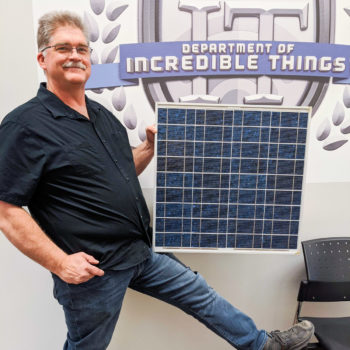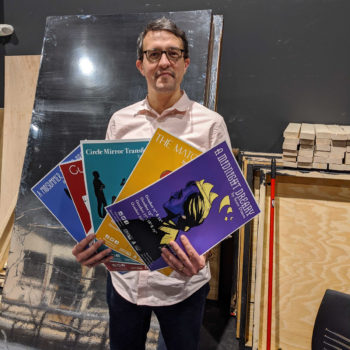
Program Chair Brad Luhrs poses with a solar panel. DMACC will be offering an associate degree in Renewable Energy.

Theater Program Chair Carl Lindberg hopes to add eight new theater classes for Fall 2020. Photos by Cole Griffin.
Starting fall 2020, DMACC will offer new associate degrees for Video Production and Renewable Energy Technologies, as well as eight new drama classes.
Brad Luhrs is the program chair for Electronic Engineering Technology, Robotics, and Renewable Energy Technology. He comes from Norwalk, and has worked for DMACC for 11 years.
Part of the program’s expansion is the introduction of two new courses: Intro to Renewable Energy and Applied Photovoltaic Systems.
Luhrs said, “We have an element of renewable energy with wind power … but we were kind of neglecting the other big player, which is the solar energy market.”
Luhrs cites the rise in the number of solar installations across the board as a driving force behind the decision to expand DMACC’s renewable energy offerings.
“The advantages of solar power are pretty clear. It doesn’t make any sound, doesn’t kill any birds, [smaller] installations can be done on rooftops while, with larger installations, you can still mount the arrays up and do something underneath or between,” Luhrs said.
While there is an increased focus on solar power, Intro to Renewable Energy will cover many other forms of alternative power, such as biomass, water, geothermal, and more.
“I think it would be a worthwhile elective for other fields [of study] to at least understand where the world is going in terms of renewable energy resources,” Luhrs said.
While an interest in electrical safety and industrial and commercial wiring are important, Luhrs would recommend the associate degree to students who are invested in environmental concerns, like to work outside, and would be open to traveling to installation sites.
The other associate degree that is in the works is Video Production. Currently, DMACC offers both a certificate and a diploma in Video Production, but Video Production Instructor Steven Schott said he would like to see that expand. Schott lives in Ankeny, Iowa, and has worked for DMACC for about eight years; starting as an adjunct in 2012, becoming a full-time instructor in 2019.
The new classes with this degree are Sound for Film, Video II, Producing and Directing Technique, Color Correction and Grading, as well as Video Production IV. The goal of these new classes is to teach students how to record professional quality audio, manage cameras and lighting in real-world settings, editing video and sound professionally, and to learn how to direct and manage people on a set.
“That’s how we communicate with each other, so it’s becoming a very applicable skill to learn. It can be useful for a lot of jobs, not just making movies,” Schott said. “People don’t realize that Blank Park Zoo has a three person video department that shoots videos and commercials .. Principle has a five person video department … Meredith, Wells Fargo, you name it.”
“It has been approved by the DMACC curriculum committee, signed off by Rob Denson, and sent to the State of Iowa for approval by the Board of Education,” Schott said regarding the status of these new additions. He is hoping to hear back soon, so the new courses can be available for students in the Fall 2020 semester.
When Carl Lindberg, the Program Chair of DMACC Ankeny Theater, started teaching as an adjunct, there were only two theater classes: Acting I and Intro to Theater.
Since becoming a full-time instructor in 2018, 12 new theater classes have already been added and he is hoping to add another eight for the Fall 2020 semester.
Lindberg said the goal is to eventually introduce a certificate program for acting, and possibly even a certificate in Musical Theater Performance by Fall 2021.
Lindberg said the Curriculum Commission and the Vice President of Academic Affairs have approved the classes. “The bigger story is, do we have enough space, like a physical space, at DMACC to do all of these classes,” he said.
DMACC’s Black Box theater is the only viable place at the moment to house all of the theater department’s projects and classes.
“We have this really amazing, flexible space for performance and courses, but we don’t have dressing rooms … we don’t have a costume shop or a scene shop,” Lindberg said, “it’s finding the time to do all of these courses in the same room.”
There has been talk about building a Performing Arts Center on campus, but there hasn’t been any major development on that front.
While these classes, and potentially a new certificate, is a great opportunity for students interested in acting and theater, they are also meant to be fun for anyone who might have a passing interest or are looking for a new experience.
“Hopefully there are some fun things that people get to take in so that they feel like they’re engaging with culture and practicing empathy and seeing what it means to be courageous and risk failure and vulnerability … the opportunity for the arts on campus are great,” Lindberg said.”
Not only are these classes fun, there are applicable skills to be learned as well. For example, Improvisational Acting teaches people how to be adaptable and think on their feet, while Voice and Movement would be useful for students to learn their voice, and could help with public speaking.
Above all else, theater classes teach students how to work together and how to talk to people, whether it be in person, or over social media. Wherever there is an audience, it is useful to know how to speak to them.





Comments